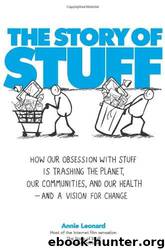The Story of Stuff: How Our Obsession with Stuff Is Trashing the Planet, Our Communities, and Our Health-and a Vision for Change by Annie Leonard

Author:Annie Leonard
Language: eng
Format: mobi
Tags: Social Science, Consumerism (Economics) - Moral and ethical aspects, Acquisitiveness, Political Science, Sustainable Living, Customs & Traditions, Nature, Acquisitiveness - Moral and ethical aspects, Sustainable development, Personal belongings, Environmental Science, Science, Environmental aspects, Economics, Moral and ethical aspects, Business & Economics, Consumption (Economics), Material culture, Life Sciences, Ecology, Natural Resources, General, Environmental Conservation & Protection, House & Home
ISBN: 9781439125663
Publisher: Free Press
Published: 2010-03-09T05:00:00+00:00
The New Economics Foundation, the think tank that produces the annual Happy Planet Index, explains that “it is possible to live long, happy lives with a much smaller ecological footprint than found in the highest-consuming nations. For example, people in the Netherlands live on average over a year longer than people in the USA, and have similar levels of life satisfaction—and yet their per-capita ecological footprint is less than half the size (4.4 global hectares compared with 9.4 global hectares). This means that the Netherlands is over twice as ecologically efficient at achieving good lives. More dramatic is the difference between Costa Rica and the USA. Costa Ricans also live slightly longer than Americans, and report much higher levels of life satisfaction, and yet have a footprint which is less than a quarter the size.”40 I find this data reassuring, because it means our poor score isn’t set in stone; we’ve been investing our resources in the wrong place, but that’s something we can change.
Unhappy Planet
While excessive shopping, acquiring, and consuming make us unhappy and anxious as individuals (assuming our basic needs are already met) and societies, they make for an extremely unhappy planet as well. The Global Footprint Network (GFN) calculates the Ecological Footprint of various countries and of the earth as a whole. It arrives at the Footprint by calculating the use of both natural resources and ecosystem services like climate moderation and water cycles and then figuring out how much land would be needed to support this use. Globally, GFN reports that we now consume the resources produced by the equivalent of 1.4 earths per year.41 That is 40 percent more earths than we have! It now takes the earth one year and five months (or very nearly five) to regenerate what we use in a year. How is that possible? Well, the planet produces a certain amount of natural resources each year; we’re not only using all of them, but we’re also dipping into the store of resources that have been accumulating since the earth began—but they won’t last forever. I was in a meeting recently in which people were debating if the number of earths’ worth of productive capacity we use annually is actually 1.4 or 1.6. Does the discrepancy even matter, people? Anything over 1.0 is a major problem, especially with population continuing to increase exponentially. This hard truth has inspired the term “one planet living,” referring to the goal of redesigning our economies and societies to live well within the ecological limits of our one planet.
While the highest rates of consumption have historically happened in wealthy regions like the United States and Europe, most developing countries now have a rising “consumer class” that is increasingly adopting the same patterns of hyperconsumption. India’s consumer class alone is thought to include more than 1 million households. The global consumer class in 2002 included 1.7 billion people, a number that is expected to rise to 2 billion by 2015—with almost half the increase occurring in developing countries.
Download
This site does not store any files on its server. We only index and link to content provided by other sites. Please contact the content providers to delete copyright contents if any and email us, we'll remove relevant links or contents immediately.
The Lonely City by Olivia Laing(4799)
Animal Frequency by Melissa Alvarez(4463)
All Creatures Great and Small by James Herriot(4311)
Walking by Henry David Thoreau(3953)
Exit West by Mohsin Hamid(3824)
Origin Story: A Big History of Everything by David Christian(3687)
COSMOS by Carl Sagan(3618)
How to Read Water: Clues and Patterns from Puddles to the Sea (Natural Navigation) by Tristan Gooley(3466)
Hedgerow by John Wright(3354)
How to Read Nature by Tristan Gooley(3335)
The Inner Life of Animals by Peter Wohlleben(3311)
How to Do Nothing by Jenny Odell(3294)
Project Animal Farm: An Accidental Journey into the Secret World of Farming and the Truth About Our Food by Sonia Faruqi(3216)
Origin Story by David Christian(3195)
Water by Ian Miller(3179)
A Forest Journey by John Perlin(3069)
The Plant Messiah by Carlos Magdalena(2927)
A Wilder Time by William E. Glassley(2859)
Forests: A Very Short Introduction by Jaboury Ghazoul(2836)
